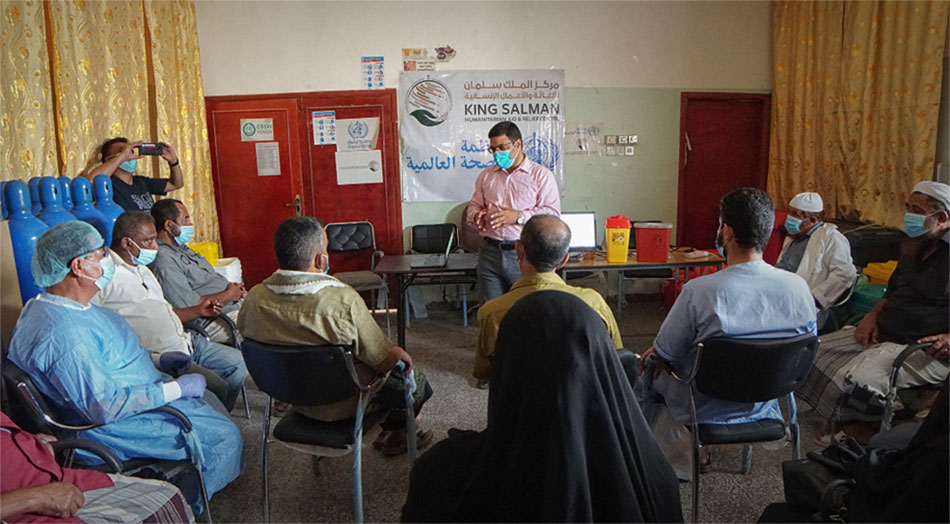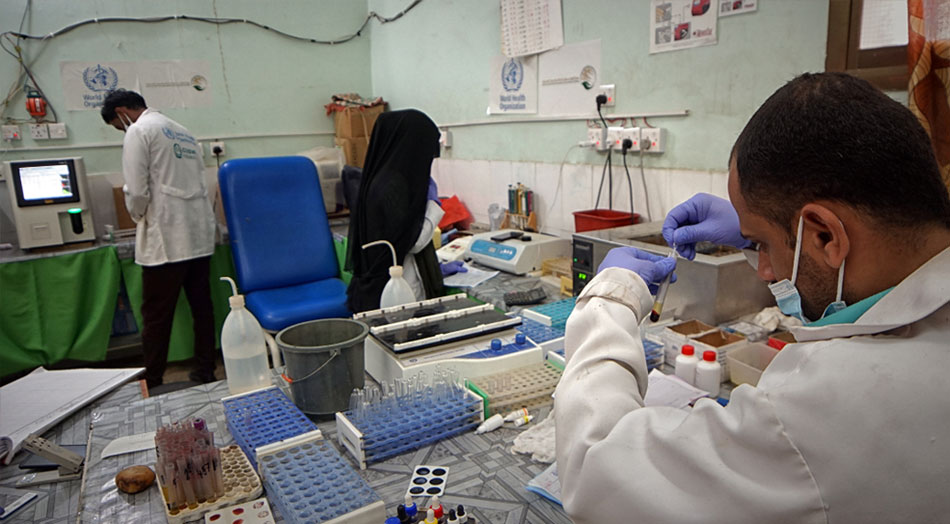 Health staff being trained as prt of the Essentail Health Services project
Health staff being trained as prt of the Essentail Health Services project
18 July 2021 – Quality of care is the degree to which health services increase the likelihood of desired health outcomes and are consistent with evidence-based professional knowledge. This definition of quality of care spans promotion, prevention, treatment, rehabilitation and palliation, and implies that quality of care can be measured and continuously improved through the provision of evidence-based care that takes into consideration the needs and preferences of service users – patients, families and communities. The Sustainable Development Goals stress that quality is a key element of universal health coverage.
Yemen has been in the clutches of a prolonged conflict, economic decline and scarcity of resources, all contributing to extremely poor health outcomes and inadequate quality of care. This has put the lives of the people of Yemen at further risk of death and disease.
WHO and the King Salman Humanitarian Aid and Relief Centre (KSrelief) have started a new project to support the delivery of essential health services in Yemen through improving the provision of quality health care. As part of the project, on-the-job training has been undertaken for 415 health workers to improve the quality of services in 19 health facilities across 7 governorates.
The need to improve the quality of health care in Yemen was identified by a quality of health care assessment conducted by WHO in health facilities in the targeted governorates. The assessment found that the majority of critical quality standards were not being applied in the assessed hospitals, that a culture of quality was almost nonexistent and that hospital management and staff had very limited knowledge regarding basic concepts of quality in health care.
Most of the targeted hospitals did not have infection prevention control (IPC) programmes and did not have a system to apply basic IPC measures, nor a management system for applying critical quality standards for medicines and equipment. This situation endangers the safety of the patients, putting them at high risk of hospital-acquired infections and the associated morbidity.
Dr Fahmi Abdulla works as Deputy Hospital Director and Epidemiological Surveillance Officer in the WHO-targeted Lawdar hospital in Abyan governorate. He says:
“Our work entails dealing with patients with great care and passion. We are responsible for the lives of our patients, and we do not take this responsibility lightly. In our work environment, meticulous skill is needed to provide quality health care.”
This is echoed by Dr Raja’a Abdulrahman, Emergency Department Officer at Ahwar hospital in Abyan governorate, who says:
“Not only do we need to save the lives of our patients, but also to maintain our own safety from infection. The training we received is therefore critical. We were trained on procedures to ensure the safety of patients as well as health workers through applying critical infection control standards and the management of quality health standards.”
 Participants were trained on quality of care and patient safety
Participants were trained on quality of care and patient safety
The training provided by the project aims to fill the existing gaps in quality health care in Yemen. It included discussion of the spectrum of quality concept and quality policies and improvement for health care procedures. Participants were trained on quality of care and patient safety, including the International Patient Safety Goals, and in leadership and management quality standards and skills. The training also covered human resources quality standards, including policies and standards related to the availability and qualification of staff, training of staff and staff satisfaction.
Of the training, Dr Mahdi, Head of the Laboratory Department at Shahid Saleh hospital, says:
"Training in the field of quality health care is being held for the first time in Yemen. This model is newly introduced to our health facilities and to the health system at large. Before this training, health services were lacking these structures due to the absence of infection prevention and control measures and quality health care standards. Both our lives and the lives of patients were placed at risk. Health services should be provided by qualified staff to ensure the provision of effective and safe health care.”
As an outcome of the training, quality programmes in the targeted hospitals have been initiated and the hospitals have started working on developing their organograms and job descriptions.
According to Dr Fahmi Abdulla:
“Applying leadership and management quality standards, in addition to creating organograms and clear job descriptions, has proven extremely beneficial in improving the quality of health care. We have also been equipped with proficiencies that will enable us to safely organize patients and those who accompany them.”
The hospitals are rolling out quality programmes and on-the-job training in quality standards for the rest of their staff to improve the provision of effective and safe health care services and the implementation of critical quality standards.
Dr Mohammed Al Sanea, head of the COVID-19 isolation centre in Al Makha hospital, says that:
“We have been helped by receiving much-needed knowledge for managing epidemic cases, sterilization and sorting cases, as well as improving the quality of health care. We have already started applying the learnt procedures in the COVID-19 isolation centres.”
This critical capacity-building training is part of the Essential Health Services project supported through partnership with KSrelief, which aims to improve the quality of care in Yemen and ensure that health services are effective, safe and patient-centered in around 19 health facilities across the country, reaching 2 million people.




